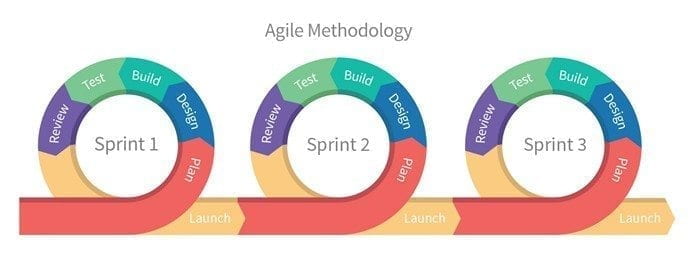
While innovation ranks higher than ever on the strategic agenda of top managers, and R&D spend continues to grow, the failure to meet time, cost, and quality targets remains high. In software development, over a quarter of projects are never completed and nearly two-thirds experience budget and schedule overruns. Thus, identifying the factors that improve innovation performance is essential.
Innovation studies indicated inappropriate approaches to the management of the new product development process as a key reason for failure.
Recently, a new class of process models has emerged that operates differently from the traditional and linear methods. The linear methods that include Stage-Gate and Waterfall, prescribe detailed product specifications and front-end plans, sequential phases, development activities adhering to agreed specifications, and strictly defined criteria.
In contrast, flexible models, such as Agile and lean start-up, advocate minimal up-front planning, adapting product design to changing requirements until late in the new product development process, involving users early through prototyping and frequent testing, organizing development work in iterations of time-boxed design-build-test. Thus, the potential for a paradigm shift is significant and recent studies report a growing trend of migrating from linear plan-driven models to Agile.
Accordingly, a key driver of the adoption of Agile is the uncertainty and volatility of business environments and for new product development this means that most innovation projects start with incomplete knowledge of customer needs and the technologies used to fulfil needs that may change over the course of projects.
With today’s intensified competition, rapid technological advances, and fluid market demands, agility, defined as the ability to quickly change plans and scope in response to unanticipated and evolving requirements is and imperative not an option.
Thus, the present study investigates the influence of plan-driven Stage-Gate models, flexible Agile models, and their combination, on new product development speed, cost, and quality performance. In doing so, we developed an original conceptualization of the two models based on their underlying principles for managing the uncertainty inherent in innovation processes and the changes that result from deviations from the plans.
Accordingly, the analysis of survey data on 181 software developers shows that the adoption of Stage-Gate principles is negatively associated with speed and cost performance. For Agile, the use of sprints is positively related to new product quality, on-time and on-budget completion, while early and frequent user feedback would seem to prolong time-to-market. The results also highlight a nuanced interaction between Stage-Gate and Agile, both positive and negative depending on the principles considered.
As a result, the present study suggests that organizations with Stage-Gate systems should start a stepwise transition towards Agile by adopting sprints for micro-planning and task execution. Even if reluctant to fully abandon linear plan-driven models due to the strong negative association between Stage-Gate and performance, adhering to the traditional way of developing a new product may lead to new product development failure. For firms with no such process model, e.g., new ventures, the suggestion is to avoid following Stage-Gate principles, which appear less adequate to deal with the uncertainty inherent in fast-changing business contexts. While not a panacea for new product development, Agile principles seem the better alternative
Please refer to the full text of the present paper for detailed information.
Author Details:
Mattia Bianchia*
aStockholm School of Economics, Department of Management and Organization
Saltmätargatan 13-17, Box 6501, 113-83 Stockholm, Sweden
E-mail: mattia.bianchi@hhs.se
Tel.: +46 8 736 95 08
Giacomo Marzib
bUniversity of Lincoln, Lincoln International Business School
Brayford Wharf E, Lincoln, UK
Email: gmarzi@lincoln.ac.uk
Massimiliano Guerinic
cPolitecnico di Milano, Department of Management, Economics and Industrial Engineering, Via Lambruschini 4b, 20156 Milano, Italy
E-mail: massimiliano.guerini@polimi.it
